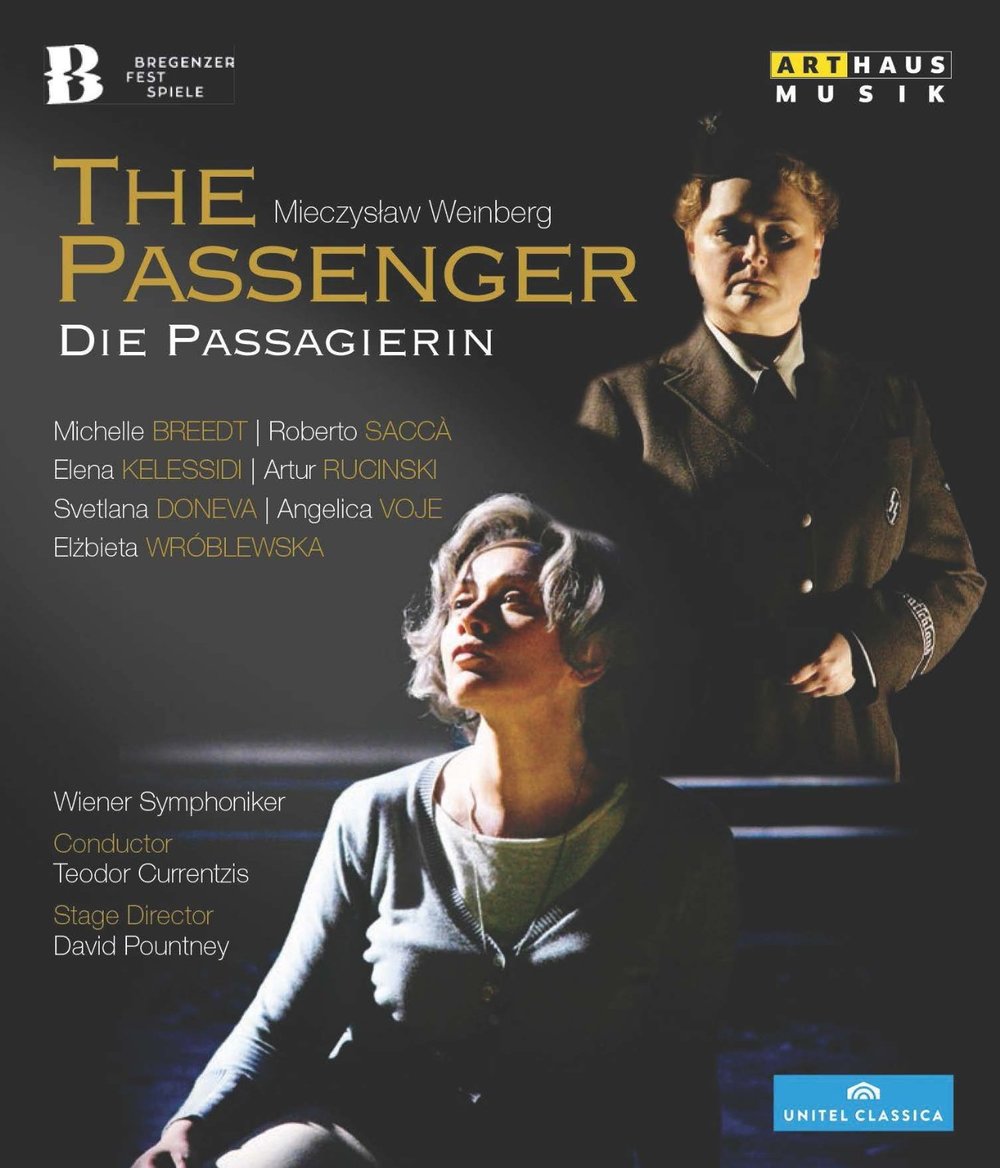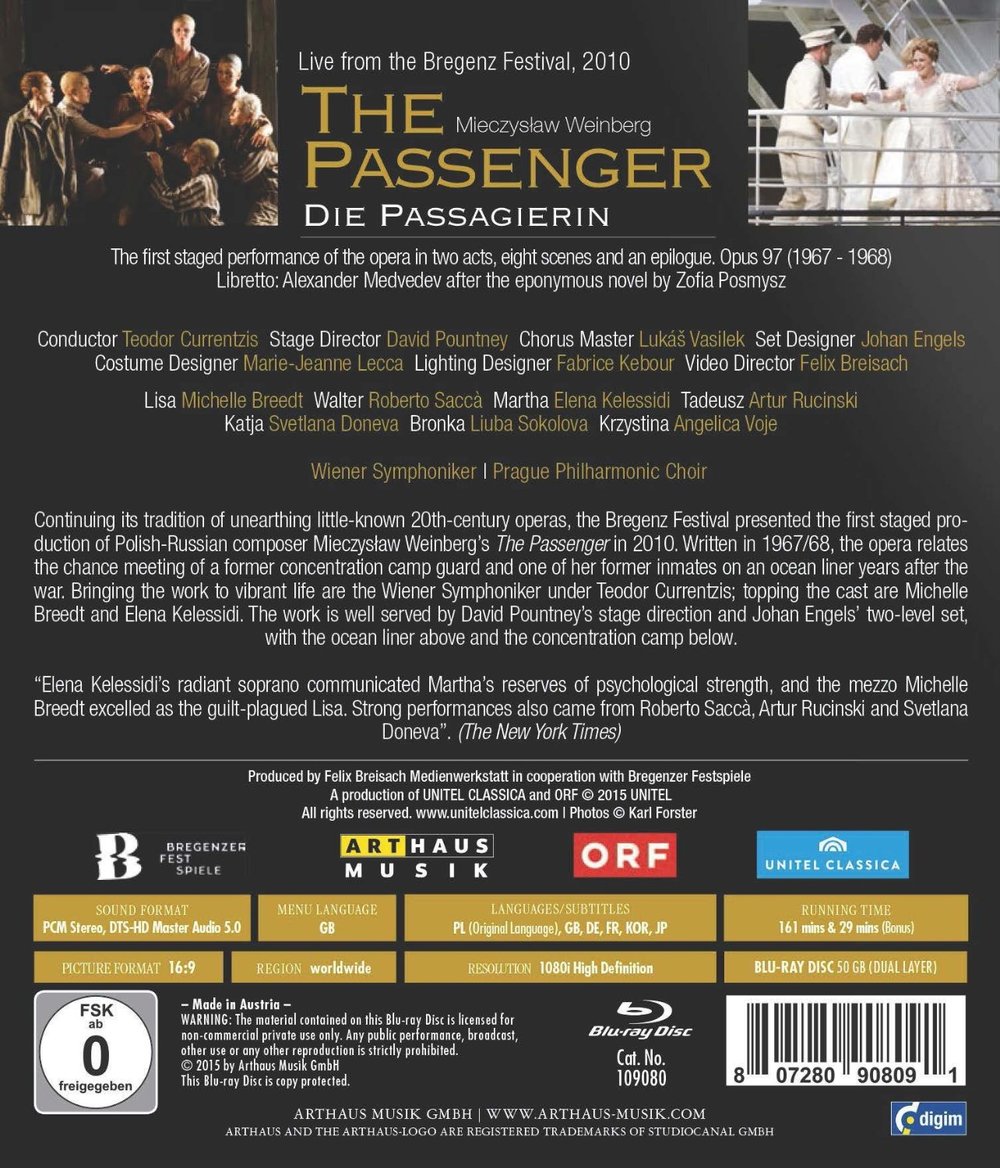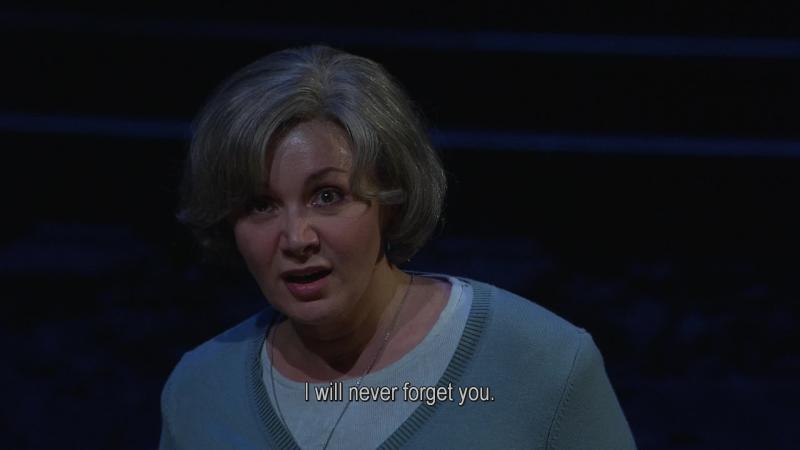

Mieczysław Weinberg The Passenger opera to libretto by Alexander Medvedev after a novel of the same name published in 1962 by concentration camp survivor Zofia Posmysz. Directed 2010 by David Pountney at the Bregenz Festival (The title in German is Die Passagierin). Stars singers Michelle Breedt (Lisa), Roberto Saccà (Walter), Elena Kelessidi (Martha), Artur Rucinski (Tadeusz), Svetlana Doneva (Katja), Angelica Voje (Krzystina), Elżbieta Wróblewska (Vlasta), Agnieszka Rehlis (Hannah), Talia Or (Ivette), Helen Field (Alte), Liuba Sokolova (Bronka), Tobias Hächler (1st SS Officer), Wilfried Staber (2nd SS Officer), David Danholt (3rd SS Officer), Richard Angas (Elderly Passenger/Steward), Heide Capovilla (Senior Overseer/Capo), David Gabl, Michael Koch, Juliusz Kubiak, and Anton Schwärzler (4 Soldiers), Michelle Lau and Matthias Zuggal (Soldiers on watchtowers), and violinist Andreas Semlitsch (Double for Tadeusz in violin scene). Also stars stage musicians Raphael Brunner, Stefan Mikic, Roger Szedalik, Dominik Neunteufel, and Michael Schatzmann. Teodor Currentzis conducts the Weiner Symphoniker and the Prague Philharmonic Choir (Choirmaster Lukáš Vasilek). Set design by Johan Engels; costume design by Marie-Jeanne Lecca; lighting design by Fabrice Kebour. Directed for TV by Felix Breisach. Sung in German, English, French, Russian and Yiddish. There is also a documentary film "In der Fremde" in German with English subtitles. Released 2015, disc has 5.0 dts-HD Master Audio sound and the documentary and extras are in stereo. Grade: A
This is the same title that was released by Neos in 2010 and later discontinued. Arthaus has a history of picking up orphaned HDVDs and republishing them with new artwork. The Neos disc package had a multi-language subtitle option as well as translation subtitles in German, English, French, Polish, and Russian. [We don't plan to buy the Arthaus version since we already have the Neos recording of this. In February 2016, we read in Gramophone (pages 89-90) that the Arthaus version sadly dropped the synopsis, the multi-language librettos, and most of the production photos that were in the Neos package. It appears that the multi-language subtitle option was also dropped. But the helpful 29-minute documentary survived.]
Zofia Posmycz, a Polish student, was sentenced as a political prisoner to Auschwitz. She was soon transferred to a series of concentration camps where she survived many ordeals. Her wide experience gave her the background to become perhaps the only famous author to write with nuance about the Holocaust from the perspectives of both the victims and the perpetrators. Although Weinberg wrote his opera in 1967-68 while living in Russia, it didn't get a full performance until 2010 at Bregenz.
In our first screenshot, WWII is over. We meet Lisa (Michelle Breedt), a one-time SS overseer at Auschwitz, and her husband Walter (Roberto Saccà), who knows nothing of Lisa's past. Walter is a diplomat who has been posted to Brazil:
Suddenly Lisa encounters a mysterious passenger (Elena Kelessidi):
Lisa knows that the mysterious passenger is Martha, who was a prisoner under Lisa's command at Auschwitz. But this cannot be, since Martha was sent "to the death block" late in the war. Lisa, whose maiden name was "Franz," is frozen in horror as suppressed memories flood her mind:
Walter soon notices his wife's strange behavior:
Walter's career would be ruined if it became known that his wife had a Nazi past:
Lisa swears truthfully that she never struck Martha or any other prisoner at Auschwitz:
And soon we enter a long flashback about life in Auschwitz and the story of Lisa and Martha there:
Role call several times each day:
Privation:
Prisoners of all types and nationalities were thrown together. Martha had a somewhat superior status because (I think) her term as a political prisoner was actually scheduled to end in several years, at least in theory. But others had no hope except for an end to the war:
The Jews had no hope:
From time to time there were selections for extermination:
The killing was easy—cleaning up was the problem:
Some prisoners collaborated and became dreaded "capos" or assistant wardens. Lisa knew that Martha would never cooperate. But Lisa treated Martha politely because Martha was a natural leader who would try to keep her fellow prisoners out of trouble. Gradually a relationship with a modicum of mutual respect developed between the two women. Here Martha wonders why Lisa's demeanor is correct . . . :
Martha's fiancé is Tadeusz, another political prisoner. Martha knows he is also at Auschwitz, but the men's quarters are strictly separated from the women's barracks. Tadeusz is part of the resistance at Auschwitz, the most dangerous activity possible in a most dangerous place. Here Tadeusz is reading news to be disseminated among the inmates. Tadeusz also has means to report to the outside world:
A capo has found a note:
Lisa asks Martha to translate the note. Martha, ever resourceful and clever, falsely reads the note out loud as a love letter, and Lisa believes her! Thus Martha saves lives, maybe including that of Tadeusz:
Martha and Lisa work in the quartermaster department that has responsibility for all the property stolen from the prisoners, including piles of musical instruments. Tadeusz is a violinist. He stumbles onto Martha at the warehouse, and Lisa learns of their meeting. Rather than punish anyone, Lisa plans to offer the lovers privileges if they will help keep the warehouse operations running smoothly:
Martha has a "birthday party" and receives a rose from Tadeusz. She sings an aria of delirious joy, the libretto of which is a poem named If God (Ha As Istem) by the romantic Hungarian poet and political revolutionary Sándor Petőf:
But things to not work out well for Lisa's plans and disaster strikes for both Martha and Tadeusz. I've told a fair amount of the plot, but there's a lot left for you to discover when you watch the disc:
And now the flashback is over:
And yes, the pretty girl on the cover of the keepcase is Martha after the war. She survived the death block. And she sings her aria in the Epilogue to Tadeusz:
The inmates at Auschwitz came from many countries and often had difficulty understanding both their captors and each other. This opera is sung in many languages, so the use of multilingual subtitles is realistic. Out of respect for the memory of the inmates, I watched The Passenger cold with the multilingual subtitles. I had considerable trouble following the story. Later I switched to English and German subtitles and had no more difficulty.
This is an excellent production of an earnest and commendable work about a difficult topic: the allocation of guilt for what happened at places like Auschwitz. The libretto, though vastly simplified from the novel by Zofia Posmycz, demands respect because it's based on the actual experiences of a prisoner who survived (without becoming a capo). It belongs in that tiny group of "operas of ideas" along with, for example, The Dialogues of the Carmélites.
The music compares well to the opera scores of Shostakowich, who supported Weinberg in Russia and wrote a glowing review of the score in 1974. David Pountney was able to assemble an outstanding cast. The orchestra and the chorus seemed to understand the importance of their tasks.
Since 2010, The Passenger has been staged several more times and more people know about it than ever before. Still, this is likely to remain the only recording for some time. I'm grading this A, but for fans of contemporary opera, it's an A+.
OR



























